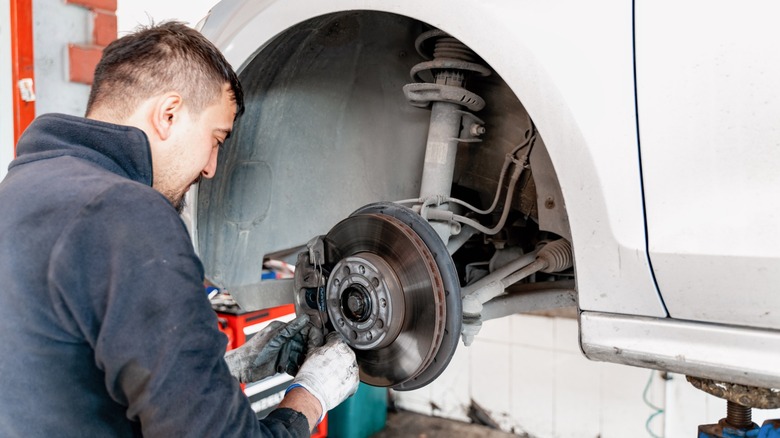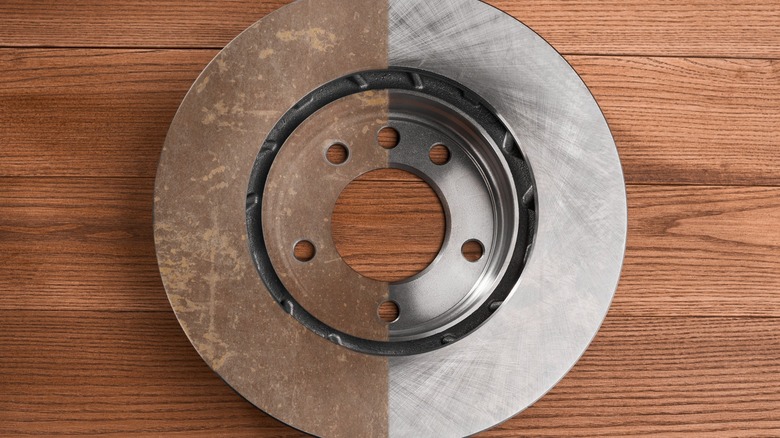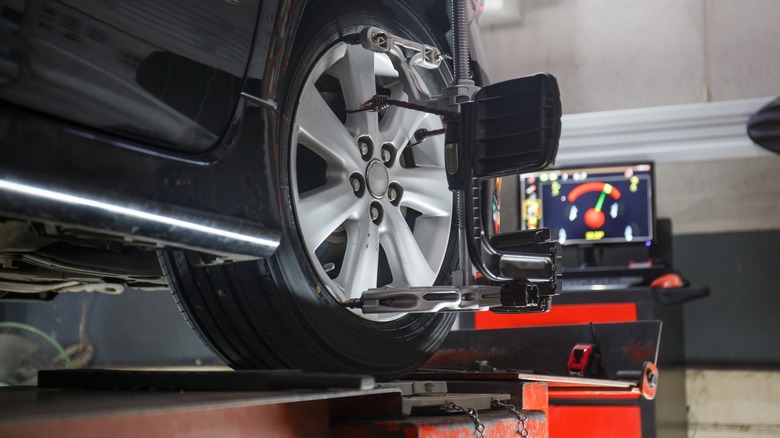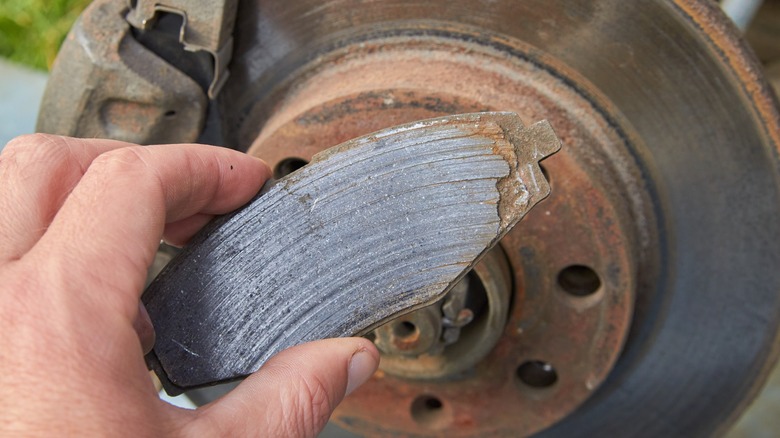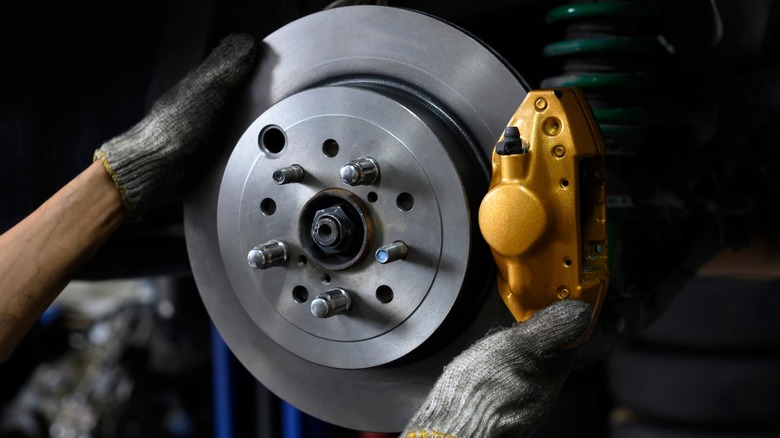Why Your Steering Wheel Might Shake When You Brake At High Speeds
It's freeing to be able to cruise comfortably down an open highway, the lack of other drivers allowing you to make the most of the space and the speed limit. It's a feeling that can quickly dissipate when you're forced to ride the brake and turn to worry when your steering wheel rattles under your grip. When you're moving at a steady and quick pace, there often appears to be nothing mechanically wrong, but the moment your foot touches the brake, you're met with a concerning shake.
Before you rush it to the mechanic only to have them find half a dozen unrelated issues, you may want to troubleshoot it or consider why your steering wheel may shake when you brake at high speeds. Could it be an unsteady road? Sure, but there could also be an issue with your vehicle, and no, we don't recommend trying to fix the problem yourself if you're not a mechanic.
The next time a drop in speed impedes your otherwise free ride, pay close attention to how your steering wheel reacts. If you were driving fast enough and it started rattling the moment you hit the brake, you may be experiencing one of the following issues.
Uneven or warped brake rotors
The typical first instinct when a car gets wobbly while braking is to assume it's the brake pads. However, another component that works with the pads may be the issue. Brake rotors are what the brake pads press against, creating friction to slow your car down. As you can imagine, if something goes wrong with the rotors, your car will be affected.
The friction between the pad and rotor creates a substantial amount of heat, especially when braking at high speeds. Over time, this can cause the rotors to warp or wear down unevenly. If the rotor surface isn't smooth, your brake pad will hit these imperfections and cause your steering wheel to jolt.
The fix is very simple: see a mechanic. Brake rotors need to be installed flawlessly so the brake pad is pressing against a flat, even surface. If they're installed improperly, you can experience the same shaking or even be at risk of an accident as your car won't be braking efficiently. Depending on the quality of your rotors, your mechanic may recommend either a full replacement or a resurfacing, which smooths the surface of your current rotors.
Other symptoms of warped rotors include a vibrating brake pedal, taking longer to brake, or screeching brakes. It's recommended that you should replace your rotors at least every 50,000 to 70,000 miles, but that can vary based on the rotors you have installed.
Misaligned or unbalanced wheels
Your car's wheels are a core component. If there's even the slightest imperfection, you'll feel it either as you're cruising or braking. The moment you start feeling your steering wheel shake while braking at high speeds, you may want to consider that your wheels are misaligned or unbalanced.
You may have heard your technician talk about aligning your wheels during oil changes. That's because tires don't wear evenly and can be subject to different driving conditions. Consider the next time you're out and about how many potholes one side of your vehicle hits. Those unexpected bumps can cause misalignment, as can driving on uneven surfaces, hitting curbs, or not slowing down for speed bumps.
Realigning your car is not an overly complicated process. However, your technician should be doing it after virtually any service. Even oil changes tend to come with a free alignment. If it's not listed with the service you're getting, simply ask so you can continue enjoying safe and smooth rides.
Other indicators that your wheels need to be aligned include your car pulling or drifting to one side, vibrations while driving, and a loose steering wheel.
Worn brake pads
Just like the rotors, your brake pads will wear down over time. They wear down quite a bit quicker than most components. Due to weight distribution while driving, your front pads are likely to wear down quicker than your rear pads, and this is when you may start noticing that distinct shaking.
If you believe your brake pads are uneven or worn, you need to replace them. Brake pads that aren't creating enough friction with the rotors can cause a dangerous scenario. Your braking distance will increase, and sometimes they may even slip. Surprisingly, if your rear brakes are more efficient than your front, you may experience difficulty handling your car.
Thankfully, the fix for worn brake pads is simple: replace them. The cost and process of replacing brake pads varies from vehicle to vehicle, but any mechanic should be able to handle the job. You can also purchase the pads and necessary equipment to replace them, but only take on the task if you're confident you can install them properly.
How often you should replace your brakes will also vary. Cars used primarily around the city should have their brakes changed every 40,000 miles or so. This can be extended to roughly 60,000 for cars that stick to the highway.
Even if your steering wheel isn't shaking, you can tell if your brake pads are worn if they're screeching or your car's stopping distance has increased. Also, some modern vehicles have an indicator light warning drivers of worn brake pads.
Brake caliper issues
Not counting the brake pedal and attached lines, three primary components cause your car to brake — the pads, rotors, and the caliper. Of them, the caliper is the start of it all. When the pedal is pressed, it signals the car to push brake fluid through the lines to the caliper, which, in turn, becomes pressurized, causing its pistons to press against the brake pad.
If the caliper isn't working properly, it can cause your steering wheel to shake. Typically, if it's a problem with your caliper, it's because the component is stuck or seizing. Not only will a seized caliper cause your car to drift and shake while braking, but it can also cause your brake pads to wear down faster.
Replacing your brake calipers isn't an exhausting job. However, it's always best to have a technician fix your braking problems to ensure repairs are done safely and properly. Improperly installed calipers can leak and fail to engage your brake pads.
Other signs your calipers may need replacing include brake fluid leaking, a soft or loose brake pedal, dragging while braking, or a grinding sound when the pedal is engaged.
